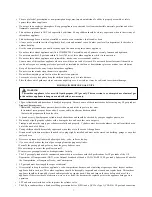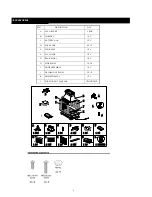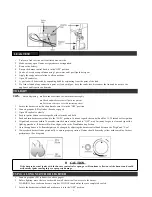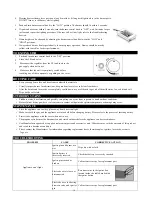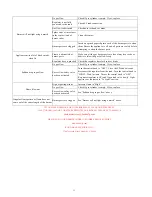
3
•
The use of alcohol, prescription or non-prescription drugs may impair an individual’s ability to properly assemble or safely
operate this outdoor appliance
•
Do not use in an explosive atmosphere. Keep gas appliance area clear and free from combustible materials, gasoline and other
flammable vapors and liquids.
•
This outdoor appliance is NOT to be operated by children. Young children should be closely supervised when in the vicinity of
this outdoor appliance.
•
This outdoor appliance is not to be installed or used in or on recreation vehicles and/or boats
•
Always use in accordance with all applicable local, state and national codes. Contact your local fire department for details on
outdoor burning.
•
Use the same precautions you would with any open fire when using this outdoor appliance
•
Do not use this outdoor appliance until it is COMPLETELY assembled and all parts are securely fastened and tightened.
•
Do not store another LP gas tank within 10 feet (3.05 m) of this outdoor appliance while it is in operation.
•
Do not use this outdoor appliance near automobiles, trucks, vans or recreational vehicles.
•
Certain areas of this outdoor appliance when in use will become too hot to touch. Do not touch hot surfaces until the unit has
cooled unless you are wearing protective gear such as insulated pot holders or heat resistant gloves or mittens to avoid burns.
•
Keep all electrical cords away from a hot outdoor appliance.
•
Do not sit on the mantle when the unit is in operation.
•
Do not throw anything onto the fire when the unit is in operation.
•
Lava rocks are very hot; please keep the children or pets away at a safe distance.
•
Place the hose out of pathways where someone might trip over it or it where it may be subjected to accidental damage.
FOR LIQUID PROPANE GAS UNITS
WARNING
This outdoor appliance is for use with liquid propane (LP) gas only. The conversion to or attempted use of natural gas
in this outdoor appliance is dangerous and will void your warranty.
•
LP gas is flammable and hazardous if handled improperly. Become aware of the characteristics before using any LP gas product.
Propane Characteristics:
- Flammable, explosive under pressure, heavier than air and settles in pools in low areas.
- In its natural state, propane has no odor. For your safety, an odorant has been added.
- Contact with propane could burn the skin.
•
A dented or rusty liquid propane cylinder may be hazardous and should be checked by your gas supplier prior to use.
•
Do not use a liquid propane cylinder with a damaged valve and any other worn out parts.
•
Transport and store the empty gas cylinders carefully and properly. Cylinders must be stored outdoors in a well-ventilated area
out of the reach of children.
•
Young children should be carefully supervised when they are in the area of the appliance.
•
Disconnected cylinders must have threaded valve plugs tightly installed and must not be stored in a building, garage or any other
enclosed area.
•
Never use a propane cylinder with a damaged body, valve, collar or footing.
•
If you see, smell or hear the hiss of gas escaping from the propane cylinder:
1 Turn off the gas supply and get away from the gas cylinder at once.
2 Do not attempt to correct the problem yourself.
3 Contact your gas supplier and/or fire departement for help.
•
The LP gas supply tank must be constructed and marked in accordance with the Specifications for LP gas tanks of the U.S.
Department of Transportation (DOT) or the National Standard of Canada, CAN/CSA-B339, LP gas tanks, Spheres and Tubes for
the Transportation of Dangerous Goods; and Commission.
•
LP gas tank must be arranged for vapor withdrawal.
•
It is essential to keep the outdoor appliance’s valve compartment, burners, and circulating air passages clean. Inspect outdoor
appliance before each use. This outdoor appliance should be thoroughly inspected and cleaned on a regular basis. This outdoor
appliance should be thoroughly cleaned and inspected on a regular basis. Clean and inspect the hose before each use of the
appliance. If there is evidence of abrasion, wear, cuts, or leaks, the hose must be replaced prior to the appliance being put into
operation.
•
LP Tank used must include a collar to protect the cylinder valve
•
The LP gas tank must have a listed overfilling prevention device (OPD) and a QCCI or Type I (CGA810) LP gas tank connection.



